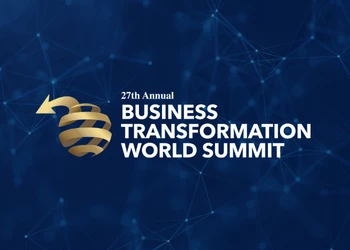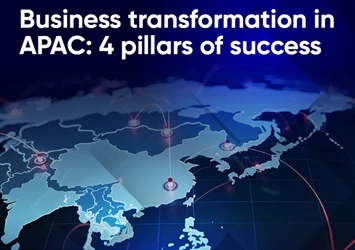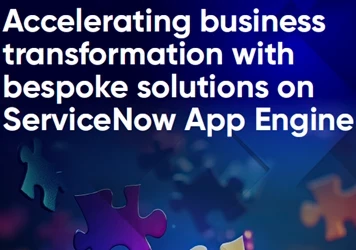Podcast: “Radical transparency is needed during any transformation”
Add bookmarkEPISODE OVERVIEW:
Patti Hatter joins us from the OPEX Summit San Diego where she shares her experience as a chief information officer (CIO) and as an executive leading transformation at sizable organizations.
Patti says that it’s a lot of fun when you’re able to move through the transformation change, figuring out how to put the puzzle pieces together in a way that makes sense for your team, for the organization and moves the business forward.
A key tool for Patti during any transformation is "radical transparency.” She coined the term to combat and debunk any distrust or misunderstanding between IT and everyone else in the organization.
LISTEN NOW:
Want more? Become a member of the Process Excellence Network and we'll keep you up to date with all the latest podcast episodes, delivered fresh to your inbox each week. Sign up today
TRANSCRIPT:
(The following is an automated and unedited transcript. Please be aware that errors may be present.)
Interviewer: Seth Adler
Guest: Patty Hatter
Seth Adler: Patty Hatter joins us. First, some supporters to thank and thank you for listening.
This episode is supported by the Process Excellence Network. PEX Network is a global community for process professionals, business leaders and executives who want to improve their businesses through process and operational excellence. With a global membership of 130,000 plus and a burgeoning global [00:00:30] portfolio of live events, webinars and networking opportunities, PEX Network provides access to experience process professionals and industry insider insight. Go to pexnetwork.com to find out.
This episode is also supported by Process Excellence Europe, establish a customer centric culture of continuous improvement to drive change, innovation and sustainability for the modern customer, October 22-24 2018 at the Postilion Convention Center, Amsterdam. [00:01:00] Customers are evolving faster than your business and showing no signs of slowing down. Join your process excellence peers and adapt to a hyper-competitive landscape or risk losing your market share. Go to performanceexcellence.com to register now.
Patty Hatter: joins us from OPEX Summit San Diego where she shares her experience as a CIO buying a GM building and as an executive leading transformation at sizeable organizations. Patty says it's a lot of fun when you're able to [00:01:30] move through the transformation change, figuring out how to put the puzzle pieces together in a way that makes sense for your team, for the organization and moves the business forward. A key tool for Patty during any transformation is radical transparency. She coined the term to combat and debunk any distrust or misunderstanding between IT and everyone else in the organization.
Welcome to PEX network on B2BiQ, I'm your host Seth Adler, download episodes on pexnetwork.com or through our app on iTunes within the iTunes podcast [00:02:00] app, in Google Play or wherever you currently get your podcasts. Patty Hatter.
Patty Hatter: McAfee where I was CIO, head of operations and then most recently SVP in GM for our new services unit. Once we got through the spin out, which came on the heels of the spin in. At the beginning of the summer I took the opportunity to start working with a number of VC's and startups [00:02:30] in the valley because I've been very fortunate on being on both sides of the table. As the VC's like to say, a CIO buying and a GM building. And so it's been a very energizing, very fun working with a wide variety of startups who are trying to figure out how do we get a value proposition and how do we get connected to CIO's to get our story out there.
Seth Adler: Sounds like much more fun, right?
Patty Hatter: [00:03:00] It's been fun, it's been fun. I'll go back to a regular operator role at some point but this has been great.
Seth Adler: Why would you do that because you just have this whole session here at OPEX Summit on transformation and it just sounds very difficult, right, to do where you need to do. And that's only one thing, that's not even your main day job stuff. So I just wondered why he would want this for yourself.
Patty Hatter: It's a [00:03:30] lot of fun when you're able to move through that change.
Seth Adler: Once you get to the other side.
Patty Hatter: Getting to the other side. And even the journey, building the team, it's hard and it is challenging but in a weird way it's a rush of can you figure out how to put all these puzzle pieces together in a way that makes sense for your team, for the organization and moves the business forward.
Seth Adler: All right. So let's make sure that we [00:04:00] understand what we're talking about and by that I mean the listener who is hearing us talk about what we know we're discussing. Let's let them in on the conversation. Engaged in this transformation kind of, I don't even want to call it a project, it was a change in ...
Patty Hatter: A way of life.
Seth Adler: Exactly. And the one phrase that I kind of keyed in on was radical transparency.
Patty Hatter: Yes, yes.
Seth Adler: Was radical transparency, [00:04:30] right?
Patty Hatter: Yes.
Seth Adler: What is the definition of radical transparency as far as Patty's concerned.
Patty Hatter: I mentioned that phrase and it's one that we used a lot in the organization in the context of one of the transformations that we went through during my time at McAfee when I was our CIO and head of operations. We coined the phrase radical transparency because when I came into that role and came into the company there was [00:05:00] such a level of distrust, misunderstanding between IT and every other part of the business such that I used the one story about people actually feeling that IT was doing these somehow secret projects and was taking the budget because there seemed to be such a disconnect between IT and the rest of the organization.
And so, we had to swing the pendulum because [00:05:30] we had a lot to do, so we had to swing the pendulum as quickly as we could to get the trust to drive successfully forward with the transformations that we needed and we weren't going to get there with people in the rest of the business thinking IT's off on its little mission. We had to show all our cards every day to everybody in the organization and to make the point, that's how [00:06:00] we got to the phrase, it's not just transparency, it's radical transparency that we need.
Seth Adler: When you say show your cards every day, what are some of the other things besides this, besides coining this phrase, What are some of the other things that you did? My memory of your suggesting that anyone could see the budget if they'd like struck a chord with me.
Patty Hatter: That was one of the very first things that we did because relative to getting [00:06:30] that buy in and that trust between IT and the rest of the business because there really was concern of where is the money going, not just IT isn't that effective but really where is it going. My experiences, as soon as you can let people show there's nothing to hide, we can debate whether you know we want to move budgets around and we can talk about that every day but there's nothing to hide.
And literally, as soon as I told folks, [00:07:00] and I had mentioned it all the time because I would personally find it funny that nobody took me up on this after people were making such a fuss about I need to know, okay, fine, let's meet at the end of the day and we'll stay all night, we'll order pizza, whatever you want.
Seth Adler: We'll have a cup of coffee, we'll have a drink, whatever you want to do.
Patty Hatter: Right, and we will go through the numbers. It was a real even learning for me that people could feel so passionate and worried about something until you say, hey, [00:07:30] there's nothing to worry about, let me show you and then the worry just starts to disappear. So that was a real lesson.
Seth Adler: So, we're going to come in here, we're going to engage in radical transparency so much so that I'm going to show you the budget. Come on is, we're going to sit here, we can sit here all night, whatever you want to do. Now, okay, got it, Patty, I'm taking you seriously now, I understand that you're really actually doing or actually living this [00:08:00] radical transparency thing. What were the actual things that you had to do though to make a transformation occur? If those were the kind of first couple of ideas of we're going to be transparent, we're going to prove that we're going to be transparent. What did we then actually do to transform?
Patty Hatter: And I've done transformation in a number of different companies and we talked through a few examples but I have to say in my IT, in my CIO role, [00:08:30] that's where I had to make the biggest leadership changes the fastest of any transformation that I've done because in a sense we had great individual contributors, so great technical skills and very poor senior leadership within IT. So the the bad behaviors and the bad leadership qualities that those [00:09:00] VP's reporting to me were demonstrating every day was just a lid on the creativity and a lid on the abilities that our individual contributors had.
We had so much that we needed to do. So many parallel transformations that we had to do in the organization all at the same time and IT was a key piece of all them that I couldn't have my VP's [00:09:30] under me spending as much energy and time shooting arrows at each other as they were trying to solve the problems. And given the pace of change that we needed to be able to support in IT, I had to swing the pendulum very hard to say okay, I'm willing to take the tough medicine and make the tough calls so in three, I mentioned this during the presentation, in three quarters we went from in the IT part [00:10:00] of my shop from six direct reports, consolidated that into three roles and only one person stayed the same.
So it's not that I love firing people but we had such an issue, we had great talent in the organization and very poor leadership. And it was better to rip the band- in this situation, better to rip the bandaid off you know and show the people that I was willing to take the hard decisions and I need them to take those [00:10:30] as well with me but I've got to show that I'm willing to do it first. So it was a bandaid ripped off in a pretty quick order. But it did what I was hoping it would do. It signaled to the organization of hey, I'm serious, I'm willing to take the hard decisions, I'm here with you because now all of a sudden I'm in the details because this one layer is completely gone as I start interviewing and filling it.
But that was even good because then all of a sudden you have much more visibility [00:11:00] into the organization that's not filtered by an extra layer of management. So it was really critical for us.
Seth Adler: So you mentioned visibility and I wonder how you got that but just quickly, I'm with you, if you can't change the people, change the people, right?
Patty Hatter: Exactly.
Seth Adler: But as far as that visibility before, on your way into realizing, oh my god, this layer here doesn't work, how were you able to see the talent underneath that layer at your vaunted [00:11:30] position? In all seriousness, folks that are listening are C level or even EVP's or SVP's or VP's or directors. And so, C level folks have a whole different kind of day than everybody else. And so, how were you able to see past the one level below you.
Patty Hatter: And that's a great question and I would actively make sure I was scheduling enough time. I loved to do skip levels. I loved to do round tables. [00:12:00] You can get a beat on your organization so quickly when you're hearing it directly from your teams. They'll tell you. This was not my own rocket science to figure this out. The only thing I did was make time to talk to the very bright people that were down in the organization and they told me ran I did it. That was a key reason for the success.
Seth Adler: They told you, how were they able to kind of couch feedback [00:12:30] in a way that you understood that here's where the problem is without kind of outing themselves as kind of complaining about my boss?
Patty Hatter: Yeah, and you get a little bit of everything but you have to be willing to hear, and that's part of the radical transformation, you have to let the organization know pretty quickly, tell me anything.
Seth Adler: Just lay it out there.
Patty Hatter: Lay it out there. And I would tell folks all the time the only way you'll run afoul of me is if you keep something from me [00:13:00] because I'll figure it out.
Seth Adler: Okay, Patty, got it.
Patty Hatter: And then you and I will have a different conversation. But if you see an issue and you're telling me about that, we will have that conversation everyday and I will spend every hour trying to help you get that resolved. If you're laying those big bold guiding principles out for your organization you have to be willing to follow it up and not crucify the first person that gives you bad news and listen [00:13:30] to everything and be able to synthesize the input that you're getting. If you've gotten to at leadership level, you've figured out how to read people and ...
Seth Adler: Well, that's hope, right?
Patty Hatter: Yeah. And if not, then you'll have an issue because you get a bunch of different inputs but I think a core skill for anybody that's at a leader level is reading folks and trying to [00:14:00] get information and the insights out of them. And I think people can feel when you're being very straightforward with them and know that hey, she really is trying to understand what's going on, she's trying to have our backs, let's work this.
Seth Adler: So, let's do this. So, you've got your team now and you understand where the issues are, you actually eliminate the issues and then here we go. What were some of the next steps as far as [00:14:30] transformation?
Patty Hatter: Here's an example. The transformation roadmap that we had. The first year I would not have wished on my worst enemy, because we had so many years of pent up big programs that weren't ever getting over the line because we had, the company had grown through acquisition so it was just layer over layer of out on another business model, oh that business [00:15:00] model's half like this other one but let's just keep them both and let's keep all the processes and lets keep all the systems-
Seth Adler: Don't lose anything.
Patty Hatter: Right. Because it takes time to weed your way through all that and there wasn't time or inclination or money until things got so bad that folks felt like they couldn't move at all and that's actually when when I was brought in.
Seth Adler: Grow now, we'll worry about that later.
Patty Hatter: Exactly. And a lot of mid-size companies are like that especially [00:15:30] in the software space because it seems like this is a great recipe, it'll run forever. Nothing runs forever unless you're managing through it. So we had multiple years of pent up demand for projects that had to get over the line. We had global ordering platform that was creaking and we had to get a new one in and we had a CRM architecture that was previously signed up for, previously purchased but never implemented. [00:16:00] We had an emergency ERP upgrade that had to get done because we're moving out of the building and that was the one instance that we had. These were things, I mean you'd think I was ...
Seth Adler: All at the same time.
Patty Hatter: Yes. I was making this up if I hadn't lived through this myself. The thing that was very helpful because I had both the IT organization and operations and the first project, the first big transformation project that was up was centered in my [00:16:30] ops team so this new global ordering platform. And it was very helpful to be able to like lock my own team in a room, both IT and operations and say seriously you're not coming out until we figure this out. Because then I could show, hey, look other business teams. Hey sales look, see, nobody died. Hey marketing, look over here, look, we're all okay.
Seth Adler: I did lock them in a room but they also came out, [00:17:00] right?
Patty Hatter: Oh, I did lock them in a room, absolutely.
Seth Adler: What I'm saying is sales you can see they came out after. Let's leave that mess on the table for a minute and let's go all the way back. How do we have the pleasure of Patty understanding exactly what to do in this chaos. So where are you from?
Patty Hatter: Where am I from?
Seth Adler: Yeah. Geographically.
Patty Hatter: Oh, geographically. I'm from Pittsburgh. Go Steelers I must stay.
Seth Adler: Go Steelers, 412.
Patty Hatter: Yes, exactly.
Seth Adler: Mark Cuban, also from [00:17:30] Pittsburgh.
Patty Hatter: Yes, yes, yes.
Seth Adler: And so you grew up in Pittsburgh, is that right?
Patty Hatter: I did.
Seth Adler: You remember the Pittsburgh Pirates, you remember both Barry Bonds and ...
Patty Hatter: All the best players used to be.
Seth Adler: Exactly Jim Leyland, he used to be, right ...
Patty Hatter: A coach, yeah.
Seth Adler: All right. So that's you and then when did you realize what your brain was. In other words, you're this tech-ops person, this is a unique type of brain. When did this occur to you?
Patty Hatter: Well, [00:18:00] I've always and it's an interesting question but I've always sought out very different roles. Once I do one then I want to go do something else. And I would say my first inkling of Patty does a bunch of different things was actually, so I went to, I grew up in Pittsburgh, went undergrad and graduate school in engineering at Carnegie Mellon. And ended up at Bell Labs for my first job. I had the perfect verse boss [00:18:30] because I trusted him, he trusted me and he gave me things beyond my young little years.
So one point, we were, you know, I started out doing systems engineering stuff like all good Bell Labs folks do. Before I know it, I go from this very technical person to hey Patty, go out with the sales teams and figure it out, you're the technical person, figure out what they need. Okay. I didn't have [00:19:00] any context to say, no, I shouldn't be doing that or I can't do that or how would I do that. It's like sure, I can figure it out.
Seth Adler: Young enough and not born after 1990.
Patty Hatter: Right.
Seth Adler: So you were able to say yes.
Patty Hatter: Right, right, so I just often did. So we ended up growing this whole new solutions type business off the cuff in the U.S. So I come into work one day in New Jersey [00:19:30] and my boss calls me in his office and he's like Patty, I have an idea, here's my idea. You go to Europe, you move to Europe, you build a business like we're building here, you come back. That's my idea.
Seth Adler: He loved you is what it is, right?
Patty Hatter: We were a great team. He trusted me, I trusted him. So, here's the trust part. The sum total of my European experience [00:20:00] before that was four days on vacation in Germany, and that was it. Never been there on business, never talked to any customers, never talked to anybody in AT&T in Europe. But I thought, okay, he thinks it's possible, I could probably figure it out. What's the worst that can happen, I come back, it will be a great learning. Well, this will be interesting, off I go. Sometimes you have experiences where you have to find, [00:20:30] you know, start from a blank sheet of paper. This was find a tree, cut down a tree, make the paper, make the pencil, get a ...
Seth Adler: This was way before the blank sheet of paper.
Patty Hatter: It was where do you want to move. What country would be the right place to move to.
Seth Adler: What was he thinking. I don't understand what we're talking about right now. How is this possible in an organization of that size that he could say ...
Patty Hatter: It was the beauty of Bell Labs.
Seth Adler: Okay, okay.
Patty Hatter: People had an idea and [00:21:00] they went off and did it.
Seth Adler: All right. So where did you find your tree I guess?
Patty Hatter: So I found my tree in the Netherlands actually. So I decided to go locate. Seemed like a good idea. AT&T had a big presence in the Netherlands. It's like I'll start there and branch out from there. So after three years, we ended up with three offices, a thriving business, out with customers, projects with customers and I was getting ready to, hey, [00:21:30] it's time for me to come back to the U.S, don't you think it's time for me to come back.
Seth Adler: How did you do that? I'm sorry for interrupting but how did you ...
Patty Hatter: You just start doing, you just start doing.
Seth Adler: So I understand what you're talking.
Patty Hatter: Make a phone call. I think I need sales, who can I call. I think Financial Services might be interesting, they seem to have a lot of money. Let's find the Financial Services sales guys that are there, see what their needs are. It [00:22:00] ended up being a match made in heaven because they're like you're here from the labs, oh my gosh, you know all this stuff or you know these skills. It's like, well, I don't know everything personally but I know people that do. And it was making that connection and being willing to listen, which is probably a theme of this whole thing. I talked about the willingness to listen to folks in your organization at all levels and this was the willingness to listen to [00:22:30] the sales teams that were living in those markets and out with customers all the time which was the best gift ever to hear it directly from the customers and they'll tell you what they want and what they need. Then it's just a matter of are you create of enough to pull it together for them.
Seth Adler: Right. So if aided by a great ability to listen, you wake up every morning and then don't take no for an answer.
Patty Hatter: And [00:23:00] a willingness to take crazy risk I guess might be the other.
Seth Adler: Sure. But I feel like there might be two kinds of people and apologies for the binary theory here. Folks that just go ahead and do what you're talking about and folks that can't understand going to another country, choosing the country, finding the job and doing it. there are folks that I come in contact with that do not have that [00:23:30] kind of bone structure. What do you think it is? You've now led a number of different types of people. Are there two types of people Patty I guess is my question? If so, tell me more and if not prove me wrong.
Patty Hatter: I think there are. You either have a D.N.A. to take risks and figure it out or not. I think somewhere in that mix [00:24:00] of those who are willing and those who are not, it's not that those who aren't aren't capable, it's willingness to take risk and to wrestle to the ground a level of ambiguity and make clarity out of that. when I look back over the different roles that I've had in different companies and different geographies, there's always an element of well, that's new, [00:24:30] that's different. Well that was built from scratch. And for me I know, I probably have too much of that D.N.A. of let's go, let's go take that mountain now. But I find it entertaining, energizing and I can very much say every different role that I've had I've learned a lot from that and I've sought to be able to leverage those learnings in my next job. There might be people with out with not [00:25:00] enough D.N.A. to take risks. I probably have their extra dose of that D.N.A.
Seth Adler: Don't worry, Patty's got plenty. So now it's time to come back from Europe I think is where we were. And so what happened?
Patty Hatter: So now you really question my decision making capabilities. So it's been three years, I consider a success. We have now offices of consultants in building these solutions for customers in three different countries in Europe, [00:25:30] great. I was starting to talk to my great boss who's still in New Jersey, hey, don't you think. So at this point, AT&T had just hired a new, so I'm still a baby, three years plus being a baby in the working world but a lot of experiences at this point. AT&T had just hired a new head of Europe, Middle East and Africa, this very charismatic Italian gentleman from another [00:26:00] tech company.
So it's a great coup to get him to join AT&T because this was really sort of the gauntlet down that At&T that was going to drive into even more. So I'm still based in the Netherlands, this charismatic Italian gentleman was based in Brussels. So I get a call from his office one day when he was just starting out and his assistant says, this gentleman, I'll leave out the names to protect the innocent.
Seth Adler: [00:26:30] I noticed, right.
Patty Hatter: This gentleman wants to meet with you. Fine. So I get in my car and I'm practicing my speech of person who will remain nameless. I think it's time for me to go back to the U.S., don't you, I think it's time, how about I go back. So I'm practicing all different versions of how to get this into the conversation. 10 minutes, and I am not kidding, 10 minutes into the [00:27:00] conversation with this gentleman, I have agreed to move to London.
So then on the drive back I am practicing my speech for my new husband, hey Greg, you love soccer. Hey Greg, you love beer. This is perfect, right?
Seth Adler: Premier League. You sold him on premier league. That's so great.
Patty Hatter: Chelsea was his favorite club before we went and [00:27:30] it's still his favorite club.
Seth Adler: He's gotten lucky lately, right?
Patty Hatter: Yeah, yeah. So luckily I have a very patient husband who is interested in new challenges as I am.
Seth Adler: He also married you so understands, I mean, this the thing about relationships though. Like if you don't know that it's possible that Patty;s going to drive back with this as a thing, right, you know.
Patty Hatter: This is true, this is true. But then it was three years in London, [00:28:00] and then it was really time to come back. But the process and limited information, the kind of gut feel of hey, each of these moves makes a ton of sense and I would have not changed any of that for a second. It was a huge fun, huge learning, best experience ever.
Seth Adler: We'll skip London, you're coming back, where do you land?
Patty Hatter: Atlanta. Which as a person from [00:28:30] Pittsburgh who was living in New Jersey, Atlanta seemed more foreign to me than London actually.
Seth Adler: Fair enough, fair enough.
Patty Hatter: So at this point we're six years into this whole solutions' journey. Very engaged with customers, very engaged with the whole company, the whole AT&T company there in [Amia 00:28:58] and we had built a very strong [00:29:00] business, stronger than what had evolved over those six years in the U.S. Being with an American firm, it's always great when you can build something even stronger outside the U.S. than what was inside the U.S. So we are actually able to take a lot of our lessons learned from that and move those into the business in North America.
Seth Adler: The rockstar returns type of thing. Now do it for us here stateside.
Patty Hatter: [00:29:30] There is definitely something to when you have so little, when I first moved over there, you really have to get quite creative on what are we going to do, what are our offers, what's so compelling because you don't have a lot to fall back on. And I think that needing to be very creative, very compelling helped us more quickly get to some of the approaches [00:30:00] go to markets industries that we ended up targeting.
Seth Adler: You also don't have legacy systems and thinking pushing really hard back against you.
Patty Hatter: Completely. It was like a startup under a big brand. So we're able to take a lot of those lessons and drive that then into the larger business.
Seth Adler: And then when they asked you to do it in Atlanta, how much of that heavy pushback as far as legacy systems and thinking was there?
Patty Hatter: [00:30:30] You know, there's always some. You're closer to the headquarters so that's what you, you bring up a great point because if you're in an American firm and you end up living and working in a geography outside the U.S., you do have a little bit more leeway because it's a bit catch me if you can kind of thing. So, you can try things faster. If they don't work you can modify those faster. So there's goodness [00:31:00] being near headquarters, you have a lot of resources but there's also some downsides and you can't move quite as fast.
Seth Adler: Skipping ahead to when you actually got to McAfee, how did they pull you or how did you kind of make the decision? What was the marriage there?
Patty Hatter: Right, well I was at Cisco at the time and I knew a senior ...
Seth Adler: How was John Chambers to work for I should ask?
Patty Hatter: Very fun. I have tons [00:31:30] of Chamber stories.
Seth Adler: Sorry, we've got to do it. We've got to tangent at least one. As far as great American C.E.O.'s, you know, he's on the list.
Patty Hatter: I was very fortunate to have Cisco approaching me to join them and at the time I was pregnant. Then also just had the baby because the discussions went on for a little [00:32:00] while. At one point the people that I was talking to decided okay, we need to pull out, pull out all the stops here. So I' literally, my mom who lived in Pittsburgh at the time, so I have a new baby, I do what all new moms do. They go to their mother to try to get some advice and get a little respite. I go to Pittsburgh, she helps look after the baby and I get to do things like go [00:32:30] to the gym. So I am literally in the car with my cell phone next to me driving to the gym and the phone rings and it's an area code that it's like, okay, it's no one in Pittsburgh, it's not 412.
Seth Adler: It's 415 is what it is.
Patty Hatter: Well, 415 and there was a number of other Bay Area codes. I'm driving, say hello, this is Patty Hatter and I hear, Patty, this is, I won't even [00:33:00] try to do his accent. Patty, this is John Chambers, do you have a minute. Yeah, let me just try to pull over so as to not cause an accident. And he was the most engaging, most sincere, very down to earth person you could imagine because he was telling me why it was important the role that they wanted me to do and why it [00:33:30] was important for me to do it. He was so willing to stay on and speak with me and answer any questions that I actually, I felt guilty. We're like into 45 minutes almost an hour and I'm like, okay, John, here's the thing, I'm already a shareholder of Cisco and I want you to go back and do your job. This has been great. I'm so honored you called me. But please as a shareholder, I know you have other things to do. [00:34:00] I release you to go back to ...
Seth Adler: What was the job and why was it important for you to come I wonder?
Patty Hatter: I started talking to Cisco in 2003 so this was then after the baby so early 2004. So this was when Cisco was starting to pull out of the post-2000 downturn and starting to stabilize from that. And Cisco situation was it [00:34:30] had grown phenomenally through the 90's. If you were a leader in any organization, you're only sin was to not grow fast enough, to not be able to keep up with the customer demand.
After 2000 it wasn't 50% year over year growth anymore, it was the more human normal company single digit type growth and then you really have to figure out how do you put the company together to operate [00:35:00] profitably like that and reconcile all the acquisitions and all the disparate things that had happened during those Go-Go years.
Seth Adler: Sounds familiar.
Patty Hatter: Yeah, yeah. With my AT&T background one of the things when I wasn't in Europe I was doing re-engineering projects because AT&T we'd buy and sell Fortune 500 companies kind of for lunch, over lunch. So having that sense of how to deal with scale, [00:35:30] coming in, going out, moving large pieces around was something that Cisco was very interested in getting because a lot of the folks that they, a lot of the leaders that Cisco had were ones that had grown up with it when it was a much smaller company. So a company of Cisco scale in the 2003, 2004 range was the biggest company many of the leaders had been with. So [00:36:00] having somebody who's come at it from the other side was a good complement to their skill sets.
Seth Adler: I mentioned that it's an American company. It really was one of the cornerstones of Silicon Valley.
Patty Hatter: Oh my goodness, yeah.
Seth Adler: How much of the current Silicon Valley kind of ethos was in the mindset at Cisco then? Has that all changed? How much is Silicon [00:36:30] Valley different than what Cisco was if that's a fair question?
Patty Hatter: Companies always have to keep evolving and the valley is like this living ecosystem that keeps changing. So Cisco's certainly changed as it's gotten into new businesses, evolved its business model because when you think back in the business it had at that time, proprietary hardware, kind of the [00:37:00] only game in town. Software is eating everything not just in the valley but worldwide so that definitely changes its go to market models, how it interacts with customers. The only thing that's constant is change and that goes for some of the bellwether companies in the valley like a Cisco as well as really anywhere around the world.
Seth Adler: Also people.
Patty Hatter: Right.
Seth Adler: As far as our lives are concerned. Yes okay Cisco, [00:37:30] then we were going to do the transition to McAfee So let's do that now. What exactly happened?
Patty Hatter: One of the senior leaders at Cisco from a different organization that I had worked with there went over to McAfee as their CFO and when he came over he reached out, Patty, your sorts of transformation skill sets, we really [00:38:00] need these over there. As we talked it sounded very interesting because the whole security space, I definitely saw that as a big growth area going forward and still there's tons of transformation that has to happen just in the security space and how things fan out from there. But it was a really interesting challenge because during my talk today when I was talking about mid-size companies that have grown through a lot of acquisition [00:38:30] certainly that was McAfee's situation at the time.
And that's great for a while because you're really popping up the revenues and then it will cease to be not so great if you haven't reconciled your product portfolio and all your different go to markets and the day to day business processes and systems that all your employees, partners and customers use to [00:39:00] do the work of that company. And that's kind of where we found ourselves sort of multiple years into this heavy acquisition track. So there was a real weight going on of making it feel really difficult for our employees and our customers of how do we, we know we want to get to the capabilities in those products but it's just really hard to do that.
Seth Adler: And so, out of the room come ops and IT and Patty [00:39:30] says see other business units, everything's okay, we can transform, because we left McAfee to follow you on your journey and then here we are back with chaos all over your desk. That first project you did with your own two teams and then how quickly were you able to kind of convince the rest of the organization hey guys, I did this at Cisco so I do know what I'm talking about and we just did this here so I really do know what I'm talking about. Not everybody seems to be listening, [00:40:00] here we go.
Patty Hatter: We didn't do any of that in a vacuum. So I didn't say let me disappear and do this transformation because even for the transformation on the ordering side, that wasn't just within my own teams. You need sales, you need marketing, you need the product teams of how are we bundling.
It was centered so I was able to lock more of my own folks in a room but [00:40:30] the first thing that I did there was really driving across the organization and getting a governance model in place that folks thought, okay, Patty isn't putting her finger on the scale to support ops because she has IT and she's only working for, she's only letting them do projects that are going to help her and not me because that's a big issue that CIO's have of can you get a fair and balanced [00:41:00] decision making process go on that people feel, all the leaders of all the different organizations feel like IT is listening to everybody and that it really is the priorities of the company that they're working on and not somebody's pet project or their own thing or somebody's good friends with somebody else and that's who they're working on projects for.
Seth Adler: If you were going to give advice to an executive that's going to become a CIO [00:41:30] tomorrow, congratulations, here's three things that you definitely should do, here's three things that you definitely should not do. What advice would you give that CIO?
Patty Hatter: Very first thing, build your relationships and rapport across the company. A CIO has such a interesting and hard job because you need to be familiar, more [00:42:00] than a little familiar, so let's say a lot familiar with what's going on in every other part of the organization because IT needs to support everybody, all those different business functions, all the development teams, all the go to market and the partners.
So it's really much more incumbent. It always takes two to tango but the CIO really needs to actively spend time and set up those relationships and understand [00:42:30] what's important to those other leaders and then get the structure in place for your own I.T. team that that's not just in your head but that you've lined up your organization so you have at least some number of resources, whether it's a senior person, it's a project managers, an architect or something like that that's pointed to each of those functions and product team so that there is that [00:43:00] relationship, understanding, dialogue that's going on because ...
Seth Adler: And ears, right?
Patty Hatter: Right, right. Because in the end there's all tons of different technology that can be implemented but if it doesn't get used, if you're not changing how you're doing business to leverage that automation or that data or that analysis, it's a tree far up falling in the forest that no one heard. I see a lot of CIO's [00:43:30] and a lot of IT leaders get really enamored with, look at this fancy new toy. I think if nobody wants it or nobody sees the problem this is trying to solve, you're wasting your time. That's amusing and do that at night but that's not helping your day job. So getting into the business, getting that buy in, really getting that understanding, very important.
Seth Adler: What advice would you give to anyone that's not a CIO. Anybody that's any part of [00:44:00] the organization that isn't IT there. This poor CIO is thinking and doing and feeling. How can you show maybe some empathy to this person?
Patty Hatter: Give them a hug. It always takes two to tango. You see a lot of organizations and it's kind of funny but not really that if a project goes poorly, a transformation goes poorly it's [00:44:30] always IT's fault. My experience is that's not always the case. It always takes multiple organizations including IT to have some large successful transformation. It's important for the different business functions and product teams to understand what their responsibility is and the skills and time and energy and most likely funding that they need to bring to the table to make those transformations successful. [00:45:00] Can't just be, I put two words on a cocktail napkin and pushed that cocktail napkin over to the CIO and now it's their jobs.
Any big project needs to change how people are doing work. Those people that need to change are outside of IT. What's that different process? What's that different ecosystem that you're trying to enable? What's that different strategy [00:45:30] to really drive a more profitable growth? What does that mean? What are we trying to do? And that hard strategy work I find doesn't always get done and then when that doesn't get done it kind of gets pushed to, well, it was just a project and that was an IT project and it didn't go well.
Seth Adler: Sorry, didn't work. But that's where I feel like, what I'm hearing from you, that's kind of your mind being appreciative of being a jack of all trades kind of helps.
Patty Hatter: [00:46:00] Completely. That's why I really encourage folks to take a broad array of jobs as much as you have the opportunity to do so because it really helps you get an understanding for what are those different organizations struggling with. What are those different leaders in a different part of the company, what are the pressures they're under. What pressures are they under from sales or from the partners or from other parts of the organization [00:46:30] and the more you're able to put yourself in their shoes and empathize the faster you'll be able to get to some kind of win-win that makes sense for everybody. So it's really important.
And I think a lot of times in IT organizations, people have just grown up through IT and they go from one job to the other. So they're very deep, which somebody's got to be but super narrow and from a [00:47:00] leader perspective, that's a problem.
Seth Adler: We need more and that's why you made the changes that you made when you got there.
Patty Hatter: Right.
Seth Adler: I would love to continue talking to you but I'm sure you have other stuff to do. So I have three final questions. I'll tell you what they are, Ill ask you them in order.
Patty Hatter: Okay.
Seth Adler: What has most surprised you at work along the way? What's most surprised you in life and on the soundtrack of your life, one track, one song that's got to be on there. First things first.
Patty Hatter: One track one song.
Seth Adler: [00:47:30] We'll get to it, don't worry about it. What's most surprised you at work along the way?
Patty Hatter: What's most surprised me at work. I guess how not all leaders are willing to make a call and make a decision. It's so important, it's a skill you need [00:48:00] to practice.
Seth Adler: Isn't that the nature of the position itself is to make decisions?
Patty Hatter: It should be, it should be.
Seth Adler: Okay, so what are we saying here?
Patty Hatter: Yeah, you know what I'm saying. I think it goes with the willingness to take risks. If you're willing to take risks that's a good omen for willing to make a call when a call is due. I think that's really important for people's personal development, [00:48:30] important for companies. I've seen that in my travels in different companies on different geographies and it does surprise me because I grew up on the East Coast and a lot of the organizations I've been in I've always had people running to jump on the table to say hey, the decision's mine.
If you're in a company where there isn't that sort of focus for hey, I'm willing [00:49:00] to make the call, be a real leader and be a catalyst to help get that culture in place because it's so important, it really helps a company move along much more quickly when you have every leader, not just one but every leader across an organization really willing to take the risk, bite the bullet, make the call.
Seth Adler: Take the risk, bite the bullet, make the call. Patty, that's pretty good stuff. What's most surprised you in life?
Patty Hatter: [00:49:30] Surprised me in life. This is a good surprise, not a bad surprise but friends that I've had for a long time, you keep forever.
Seth Adler: Yeah, they're good, aren't they?
Patty Hatter: Yeah. It happened again this weekend. A really close friend of mine who lives in the area, there's been a lot going on for both of us, we hadn't seen each other [00:50:00] so much over the past couple years as we saw each other constantly before. It's always such a pleasant surprise when you have friends like that and you sit down and it's like no time has passed. The conversation starts off from exactly where you left it so that's a pleasant surprise.
Seth Adler: I'm with you 100%. I just was, I don't know, two weeks ago spent some time with a friend of mine who I haven't seen or spent time with in 20 years. [00:50:30] And it was just like, I mean, we both probably look a little bit older but that's about it though.It was the same stuff.
Patty Hatter: But looked better.
Seth Adler: Yeah, of course. More refined. All right, so now here's the soundtrack thing. On the soundtrack of your life one track one song that's got to be on there. So it doesn't have to be the perfect song, it doesn't have to be your very most favorite song because is there even that thing. But on the soundtrack, is that your phone?
Patty Hatter: That's the soundtrack.
Seth Adler: [00:51:00] But it is a song that certainly would make sense to be on there. Whether it's something from your days in the Netherlands.
Patty Hatter: I can give you a group.
Seth Adler: Okay, we'll do that.
Patty Hatter: Anything by Oasis. So my whole and it drives many of my friends crazy, it's like, Patty please, no more British pop rock. I cannot take it. When we lived in London there was such [00:51:30] an emerging, London always has the best music and the best lyrics and it's just something about it there so I am forever just a British pop rock fan.
Seth Adler: That's fair. I do need to just for folks that are keeping score at home, Oasis is from Manchester. So we have to say that ...
Patty Hatter: Right, but they're known.
Seth Adler: You said London. I just want to make sure ...
Patty Hatter: I will broaden it to England.
Seth Adler: Indeed. Because [00:52:00] we can't have you getting in trouble for calling a Manchester band a London band because that's a whole different thing.
Patty Hatter: It is. It's like blur Oasis.
Seth Adler: You know exactly what you're talking about.
Patty Hatter: Exactly, exactly.
Seth Adler: This is the point. Patty, this has been a damn pleasure.
Patty Hatter: My pleasure.
Seth Adler: And there you have Patty Hatter. We had to show all of our cards every day to everybody in the organization and to make the point that's how we got to the phrase it's not just transparency it's radical transparency. [00:52:30] Very much appreciate Patty and her time, very much appreciate you and yours, stay tuned.





















